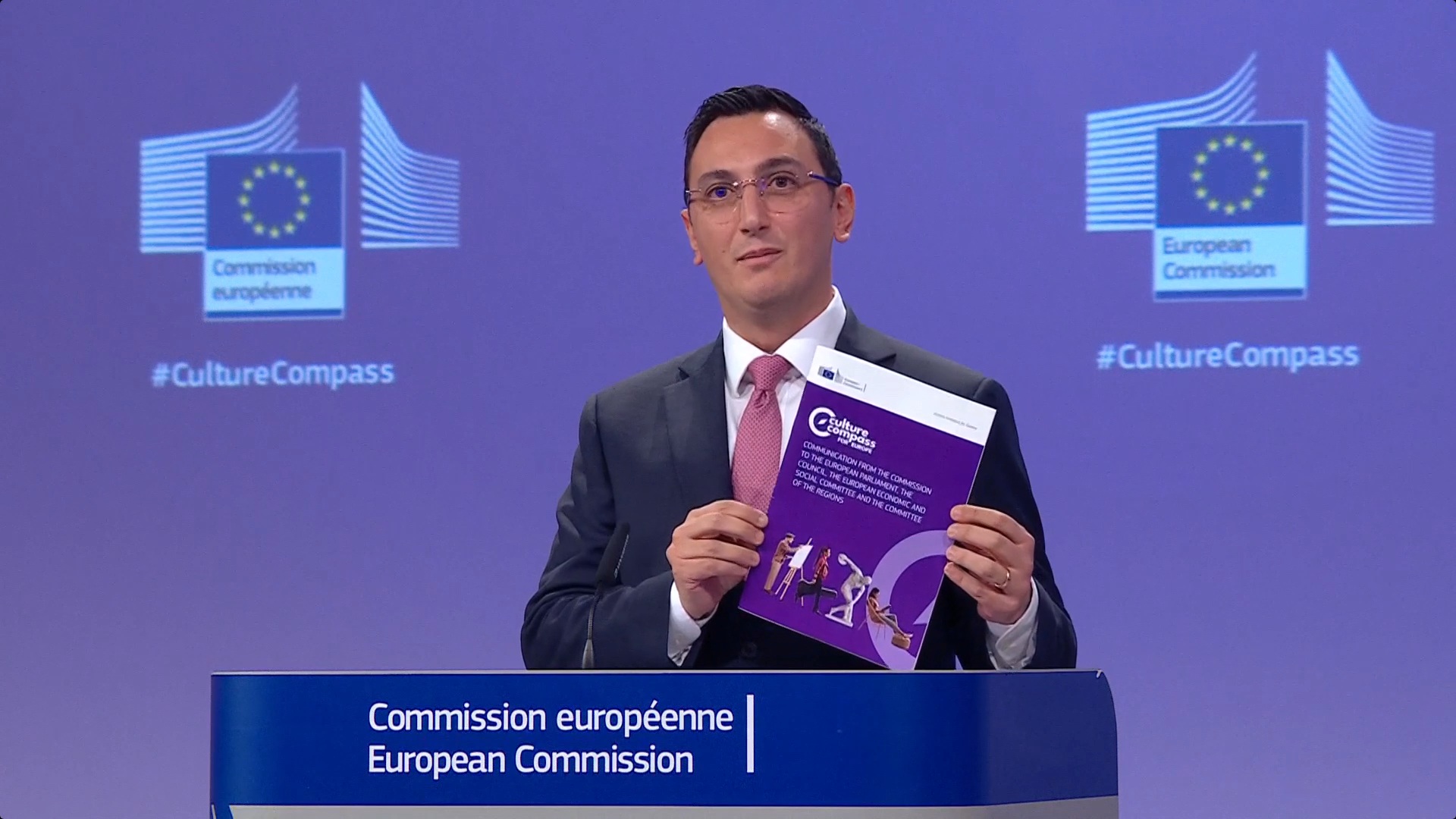
Download the Culture Compass for Europe / Download factsheet /
The European Commission released on 12 November the ‘Culture Compass for Europe‘, the new strategic framework to harness culture’s potential to make Europe more competitive, resilient and cohesive, and to tackle the most urgent challenges the sector currently faces such as the impact of artificial intelligence, the working conditions of artists and unequal access to culture.
The document was presented by Glenn Micallef, Commissioner for Intergenerational Fairness, Youth, Culture and Sport, at the European Parliament, after a year of structured dialogue with key players of the European culture and cultural heritage scene. With the Compass, the Commission presents its long-term vision for culture, which will guide EU policy beyond the previous New European Agenda for Culture (2018) and the EU Work Plan for Culture 2023-2026.
During his speech, Commissioner Micallef praised our diverse and heterogeneous cultural landscape: ‘Europe is a global cultural powerhouse, home to the world’s greatest concentration of UNESCO World Heritage sites, a rich tapestry of languages, traditions, art, architecture, and music. Our shared cultural heritage is a reflection of who we are.‘ He added that a society that invests in culture, is investing in democracy, peace and resilience, and finished his intervention with a powerful statement: ‘When Culture wins in Europe, Europe wins!‘.
The presentation of the Compass was followed by an invitation to the European Parliament and the Council to consider agreeing and co-signing a proposed a Joint Declaration as a gesture of commitment to promoting and supporting culture in Europe.
You can read more or download relevant documents here: https://culture.ec.europa.eu/news/commission-adopts-new-culture-compass-for-europe
4 key directions and 20 concrete actions
The Culture Compass outlines 20 flagship actions to be implemented the coming years, in four specific directions, to promote European culture and heritage, and address the major challenges facing cultural and creative industries.
Overarching tools
The implementation of the Compass will be supported by three overarching tools:
1. A Joint Declaration between the European Parliament, the Council and the Commission, titled “Europe for Culture – Culture for Europe on key principles for cultural policy in Europe.
2. Periodically publish a State of Culture Report to provide insights into the European cultural landscape and assess progress regarding the development of the cultural and creative ecosystem, including specific emphasis on artistic freedom and set up an EU structured dialogue on Culture with cultural and creative stakeholders to discuss the State of Culture Report and progress on delivering on the key directions of the Culture Compass.
3. An EU Cultural Data Hub, to collect and analyse cultural data, monitoring trends, and pooling best practices, supporting evidence-based policy making.
1º DIRECTION. European values and cultural rights.
4. Propose a new European Prize for Performing Arts.
5. Publish a report to support Member States in increasing the participation of and support to persons with disabilities in culture.
6. Improve young people’s access to cultural heritage by supporting national cultural heritage passes, and expanding ongoing initiatives such as the DiscoverEU Cultural Routes and the EU youth discount card under Erasmus.
2º DIRECTION. Empowering artists and cultural professionals, and supporting people.
7. Propose an EU Artists Charter in consultation with social partners and stakeholders.
8. Establish a Youth Cultural Ambassadors network to discuss culture policy matters.
9. Present EU guidelines on culture, health and well-being, for policymakers and stakeholders building on the Commission’s 2023 comprehensive approach to mental health.
3º DIRECTION. Driving competitiveness, resilience and cohesion.
10. Present an AI strategy for cultural and creative sectors, by further developing the regulatory framework that supports creative sector protecting creative content, supporting fair remuneration, and setting standards for trustworthy and human-centric AI.
11. Support the digitisation and digital transformation of the cultural heritage sector, with initiatives like the Cultural Heritage Cloud and the Common European Data Space for Cultural Heritage, in the context of the forthcoming deployment strategy 2025-2030 for the data space.
12. Strengthen the European Heritage Label and the European Capitals of Culture post-2033.
13. Adopt a Communication and a proposal for a Council Recommendation on the future of the New European Bauhaus (NEB), that harnesses the transformative power of arts and culture for creativity and innovation.
4º DIRECTION. Championing international cultural relations and partnerships.
14. Together with the High Representative of the Union for Foreign Affairs and Security Policy / Vice-President of the European Commission (HRVP), update the EU Strategy on international cultural relations.
15. Together with the HRVP, reinforce the Team Europe approach for culture, a new phase of the Cultural Relations Platform, and continued cooperation with the EU National Institutes for Culture network (EUNIC), to encourage the pooling of EU Member States resources and expertise in culture and cultural heritage.
16. Launch a new phase of the EU4Culture Programme, which supports the culture and creative sector in the six Eastern Partnership (EaP) countries: Armenia, Azerbaijan, Belarus, Georgia, Moldova, and Ukraine.
17. Launch a new Euro-Med initiative for culture, sport and tourism in the context of the Pact for the Mediterranean.
18. Launch a new European R&I Partnership for Resilient Cultural Heritage – co-funded by Horizon Europe under the Research and Innovation Cluster 2: Culture, Creativity and Inclusive Society – and dedicated to improving individual and collective capacity to anticipate, respond and adapt to situations where the protection and safeguarding of cultural heritage becomes more challenging due to increased risks of loss and damage.
Investment measures
Last but not least, the Compass will promote strategic investment in culture by:
19. Simplifying access to EU funding for culture and update the CulturEU funding guide.
20. Developing EU guidelines on strategic investment in culture, and explore innovative investment tools to attract private capital, including philanthropy, in cooperation with relevant financial institutions.





Follow us: